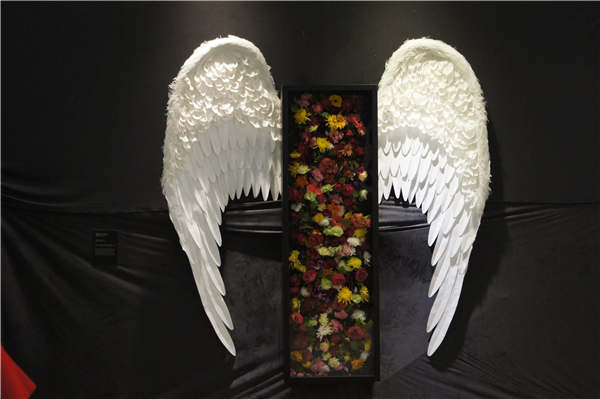
Intimate Transgressions features works by artists from home and abroad. Its highlights include Angel and Paradise Lost (above) . Photos Provided To China Daily
An ongoing exhibition at the Hangzhou Library shows violence against women during war through the multimedia artworks of contemporary artists from home and abroad.
Intimate Transgressions runs through April 16 in Hangzhou, capital of East China's Zhejiang province, and features 43 artists from China and nine other countries, including Japan, Israel and Ireland.
Since last year marked the 70th anniversary of the end of World War II, the project was initiated in New York by Sam Chen, president of the Center for Asia Pacific Affairs, an NGO that documents the brutal abuses of Chinese women by Japanese forces during the country's invasion of China.
At that time, large numbers of Chinese women were forced into sexual slavery by the Japanese military.
The CAPA decided to present the subject through contemporary art and asked Irish artist Fion Gunn to put together the New York show in September.
Gunn says the project isn't a one-time event but a conversation that will likely evolve.
After the debut exhibition in New York, Intimate Transgression was presented at Beijing's 798 art hub in October.
"We brought the exhibition to Hangzhou because Hangzhou is a major center of art," says Hu Yuanbo, art director and a curator of the Hangzhou show along with Gunn.
As an artist with ties to the city, Hu was able to pull in interesting artists from Hangzhou.
"It's also great to involve local audiences, because they know the local artists, and it's great that they can see them in an international context," Gunn tells China Daily on the sidelines of the Hangzhou show.
Nineteen local artists are part of the exhibition.
Wang Dongling, a well-known professor at the city's China Art Academy, has created a calligraphic piece inspired by his poet friend Han Bi that condemns Japanese brutality against Chinese women during the war.
The poem goes: "When men become beasts, doom falls from heaven; when people show dignity, a nation's soul can be seen."
Wang says: "I was born in 1945 (the year the war had ended), and was spared its experience, but my mother suffered. I think it is important that history is not forgotten."
He believes that it is an artist's mission to present works that reflect humanity and justice.
Violence against women and children continues. It is not only institutional but also individual.
The cultural aspects make abuse borderless, says Atsuko Nakamura, a Japanese artist whose works are on show in Hangzhou.
Female victims of violence and abuse often find it difficult to speak up, she says, and art should focus on helping them find their voices.
Born in Taiwan, Chen has been working since the 1970s on the history of the Japanese invasion of China. He founded the CAPA in 1992, believing the research will increase public awareness of the issue.
Women mainly from China, Korea, the Philippines and some other countries occupied by the Japanese in the 1930s and '40s were abducted, forced into sexual slavery and treated with such brutality that most died, says Chen.
"Following the end of hostilities, their plight was ignored. No one was held accountable for their suffering and their stories were wiped out of Japanese history books by those in power," he says.
And despite the passage of seven decades after such brutalities, rape as an instrument of war is used in many parts of the world today.
"We wish to highlight this appalling abuse of human rights by presenting this exhibition," says Chen.
But rather than documenting horrors, the exhibition aims to speak of the women's loss and resilience.
"The purpose is to bring insight and perspective."
If you go
9 am-5:30 pm, daily (Mondays closed), through April 16. Hangzhou Library, 1F, Building J, 58 Jiefang Road East, Jianggan district, Hangzhou, Zhejiang province. 0571-8653-5079.


















































